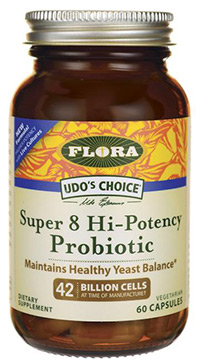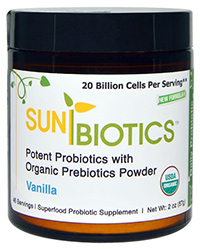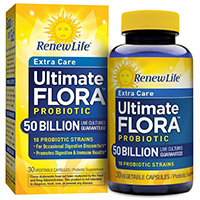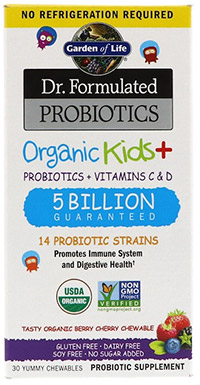The Top 10 Health Benefits of Probiotic Supplements and Foods: Heal Your Gut, Feed Your Brain and Supercharge Your Immune System
BY JO A. PANYKO
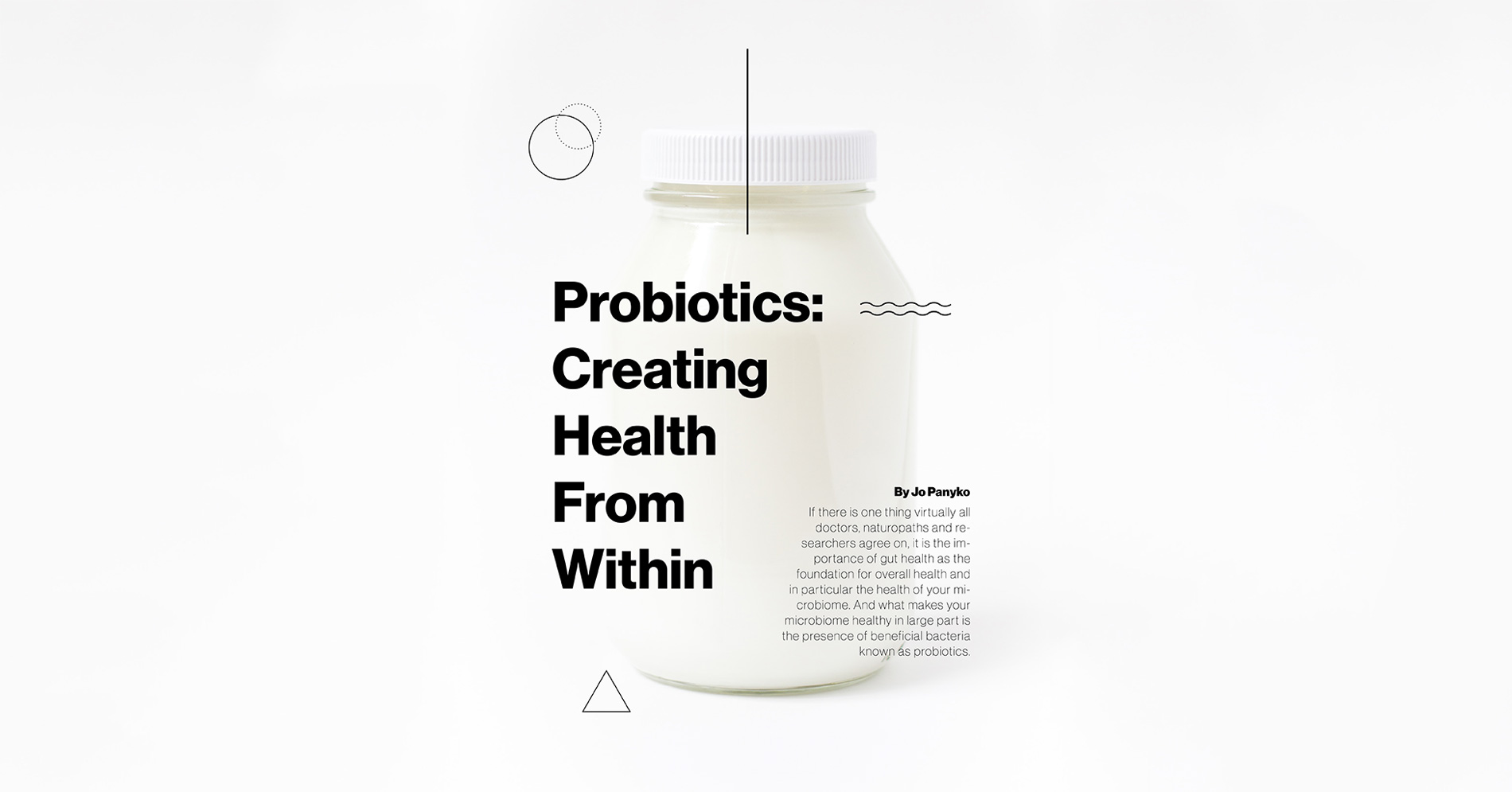
What Are Probiotics?
Probiotics are officially defined by the Joint Food and Agricultural Organization of the United Nations/World Health Organization Working Group as “Live microorganisms that, when administered in adequate amounts, confer a health benefit on the host.” Basically, probiotics at this point in time are live bacteria and yeasts that provide health benefits to you if you take them in adequate quantities.
Probiotic supplements are not drugs (in the United States), although super potent forms may be obtained through prescription. As such, they are not intended to treat or cure any diseases, mental or physical. Probiotics benefit and complement a healthy way of life filled with healthy nutritious food, adequate exercise, restorative sleep, beneficial social engagements, reduced exposure to toxins, and hydration with clean water.
Probiotics are part of your body’s microbiota, your collection of microbes. The sum of the microbiota and its metabolic activities is called your microbiome. You will often see the word “microbiome” used to denote both the microbiota and its genetic and metabolic effects.
A Brief History of Probiotics
Microorganisms such as Archaea are believed by science and research to be the earliest life forms, with bacteria and yeasts, which are also microscopic organisms, not far behind. Although bacteria and yeast cells are much smaller than human cells, it may surprise you to know that your human cells have some basic processes in common with bacteria and yeasts.
Animals, including humans, have microbes inside them that benefit them in multiple ways. These microbes are in a loose sense like probiotics, but the definition of probiotics was established to designate those microbes that have been isolated, studied, tested in a laboratory dish and/or clinically in animals and/or humans, and proven to have beneficial health properties. In many cases their genetic fingerprints were sequenced for identification purposes and also to check for potentially harmful genetic components. The official term “probiotics” established specific criteria for scientific studies and probiotic supplements, foods, and drinks.
While most probiotics are found only in probiotic pills, you can find some good probiotics and/or other beneficial microbes on raw produce; in raw, fermented foods and beverages such as yogurt, sauerkraut, kimchi, some cheeses, kefir, kombucha, and kvass; and in probiotic-fortified processed foods such as some breads and chocolates. Probiotics and other gut-beneficial microorganisms are best used preventively and with variety, so for optimum probiotics benefits, indulge in them daily, and take time to determine which are the best probiotics for you.
The concept of probiotics is credited to Élie Metchnikoff, a Russian scientist born in the mid-1800s, whose work provided profound insights into immunology and microbes. He developed a theory about aging that over the years had been forgotten in mainstream medicine but is now embraced by many scientists: namely, that health is influenced by toxic bacteria in the gastrointestinal (GI) tract. He is said to have noticed that people who lived to be over 100 years old in the Balkan States and Russia drank sour milk, which we now call yogurt or kefir, every day. In fact, Bulgarian yogurt cultures even today are regarded as highly therapeutic as they are filled with good bacteria.
The Special Benefits of Probiotics
How can something as small as a microscopic organism be so important for health? The reason is that there is not just one microbe, nor a handful; there are approximately 1 trillion microbes per gram of feces. Microbes within you are found on your mucous membranes, spanning from your mouth to your anus, from your nasal passages to your lungs, in your urinary tract, and even on your eyes. In fact, in your digestive tract alone, it is calculated that for every cell of yours that is human, there are an equal number of bacterial cells.
There are also microbes that live on your skin, and different types prefer to live in different niches of your skin. Microbiota, the collection of microorganisms, are well adapted to live in and on your body, and while they benefit from resources you provide, under normal circumstances you benefit much more from everything they do for you.
Inside your body bacterial and other microbial cells live in close contact with your own cells, and in healthy conditions the thing that separates them from you is a layer of mucus. Between that layer of mucus and the inside of you is a layer of skin-like cells one-cell thick. One thing you have to understand about your gastrointestinal (GI) tract is that although it resides within you, it is really connected to the outside world, from your lips to your anus, and the things that protect you from the outside world are the mucus; the skin-like layer of cells with immune, nervous, and endocrine cells below it; and the beneficial microbes. At least 70 percent of your immune system is in your GI tract! This is why taking probiotics benefits the immune system greatly.
The beneficial microbes, including probiotics, live with other microbes that are either benign, pathogenic (disease-causing), or opportunistic, meaning that they normally play nicely but can get out of control if given the opportunity. Actually, any microbe can cause you problems if it ends up in a place other than where it is supposed to be. Such a scenario can happen with intestinal permeability, commonly called leaky gut. Leaky gut, which is often related to irritable bowel system (IBS), happens when the layer of skin-like cells in your GI tract develops gaps in between the cells, allowing food particles, toxins, microbes, and other hazards to enter your bloodstream, if not stopped by the immune system. Since mucus, the thin layer of cells, and your immune system are your only defenses against the outside world within your digestive tract, it is very beneficial to you to have helpful microbes protecting you from potentially pathogenic microbes. These beneficial microbes can produce acids or antimicrobial products called bacteriocins, which hinder or kill pathogens. They can also stand in solidarity to prevent pathogens from taking up residence, or displace them if they do.
But beneficial microbes such as good probiotics do more than just protect you from pathogens inside and outside your body. The health benefits of probiotics can include significant effects on your digestion and nutrient absorption. Probiotics can utilize food substances, such as soluble fibers, that otherwise would be useless to your nutrition.
They can break down substances in foods that keep you from absorbing the micronutrients inside. They not only protect against the consequences of rogue molecules passing through a leaky gut, but they assist your intestinal cells in staying healthy to optimize nutrient absorption. In addition, some of the metabolic by-products of probiotics, such as short-chain fatty acids and vitamin production, are very nourishing to your GI tract and digestive health.Probiotics have direct and indirect effects on your immune system. They can help tip an imbalance in an immune response, such as in seasonal allergies, to a more balanced state. Probiotics benefits have direct and indirect effects on your nervous and endocrine systems, too, and are part of your enteric nervous system. They can influence every system in your body. Although, keep in mind that the amount of probiotic supplements and pills shown to be beneficial in research studies for various conditions (including inflammatory bowel disease, irritable bowel syndrome, and urinary tract infection) differs based on the population and condition studied, so no blanket recommendations can be made.
Cautions
Along with many of probiotics benefits, there are also a few cautions to heed as well. First, if you are immune compromised (catheters, cancer treatments, HIV, trauma, and so on), please consult your physician to check if there are any contraindications for using probiotics. Second, if you never used probiotics or a particular type of probiotic before, and/or never ate much raw food or indulged in fermented probiotic-rich foods and drinks (such as sauerkraut, kimchi, kefir, or kombucha), please proceed slowly with probiotic supplements and use. Although probiotics are tiny organisms, they can have very potent effects on your body.
As you progress with increasing dosages of probiotics internally, you may experience increased abdominal gas, upset digestion with diarrhea, headache, fever, muscle pain, brain fog, and/or anxiety. If the symptoms become too uncomfortable, decrease the dosage for a few days and try again. These symptoms are your body’s way of telling you that things—such as a die-off of pathogens (bad bacteria) or an awakened intestinal reflex—are changing.
If you ever have shortness of breath, tightness in your throat, hives, or other symptoms of an allergic reaction, discontinue use immediately and seek medical help.
The side effects of taking probiotics as your body adapts to them are usually mild if you are generally healthy. Introduce probiotic foods, drinks, and supplements gradually and soon you will be reaping the benefits of these gut-friendly good bacteria.
Overview of Probiotic Microbes
Back to the question of what are probiotics: There are five main types, each in its own classification called a genus. Within each genus there are multiple species, and within those species there are multiple strains. For example, Lactobacillus is a very common genus of probiotics. Within that genus are numerous species, such as rhamnosus. The genus and species of a microbe are always italicized, making it easy to know that a microbe is involved. In a species such as Lactobacillus rhamnosus (often abbreviated L. rhamnosus), there are many strains. An example of the name of a strain is L. rhamnosus GR-1.
Here are the most common genera you will encounter:
Lactobacillus is a common genus of probiotic, and at least thirteen different species are used as probiotics. Lactobacillus is a common resident of your GI tract and is also commonly found in the vagina. It is found on raw produce, in many fermented foods and drinks, and in probiotic pills/supplements.
Bifidobacterium is another common genus, with at least seven species used as probiotics. Bifidobacterium is a normal resident of your GI tract and is the dominant beneficial bacteria in breast milk. Probiotic supplements and fermented milk products are the best probiotic sources of Bifidobacterium.
Streptococcus has two species that are probiotics, thermophilus and salivarius. Most others act either neutrally or pathogenically in you. Thermophilus is found in yogurt. Salivarius is found in normal oral microbiota. Both species are found in supplements.
Bacillus is an interesting genus because these microbes have the ability to form endospores, tough outer coatings, when conditions are not suitable for them to flourish. There are five species of probiotic Bacillus: clausii, coagulans, indicus, licheniformis, and subtilis. Not every species of Bacillus is probiotic. Some Bacillus species are usually pathogens. Bacillus may normally be found in the GI tract, but they generally do not take up residence for long and will pass through and be eliminated if not replenished. Bacillus are common food spoilage organisms and are also found in probiotic supplements and in soil, air, and water.
Saccharomyces another genus of probiotic that passes through your digestive system tract is a yeast. There are two species used probiotically, cerevisiae, found in baker’s and brewer’s yeast, and boulardii, found in supplements.
There are other lesser-utilized probiotics, including some Leuconostoc, Lactococcus, and Clostridium butyricum, and E. coli Nissle, among others.
The world of probiotics, good bacteria, and the gut microbiome is an exciting one that is impacting and will continue to impact how health and medicine are viewed. Read on to discover more about it!
Health Benefits of Probiotics
1. Calms Reactions to Foods
Different people react to foods differently. What may be nourishing to one person may be another person’s poison. We don’t normally think of foods as being poisonous because they usually are not deadly, but foods can be toxic to a person who is allergic, intolerant, or sensitive to them. The difference in toxicity may show in symptoms.
In a food allergy, like celiac disease, there is an immediate immune reaction to the offensive food. Classic allergic symptoms such as tingling lips, burning/tightness in the mouth/throat, gastrointestinal upset, difficulty breathing, rashes, hives, and even anaphylaxis may be present. Although any food can cause an allergic reaction, the most common offenders are peanuts, tree nuts, dairy, fish, shellfish, eggs, soy, and wheat.
In a food intolerance, the body is not able to properly handle the food, but there is not an allergic reaction. A classic example is lactose intolerance.
In a food sensitivity, the immune reaction is delayed, usually several hours to days after the exposure. Food sensitivities are the most difficult to determine since there is not an immediate reaction. These kinds of issues with foods can cause a wide range of physical and mental problems. An elimination diet followed by reintroduction is one of the best ways to determine a food sensitivity.
Food allergies and sensitivities both involve the immune system, albeit in different ways. Many types of probiotics may benefit and help modulate the immune system, and they can calm these conditions, not only via immune regulation, but also through prevention of intestinal permeability, improved intestinal motility, and communication with your genes.
2. Relieves Constipation
Do you strain with infrequent bowel movements? Do the feces look like separate hard lumps or like bunches of hard lumps stuck together, or are they pencil-thin? You may have constipation. The Bristol stool chart (BSC) was developed by two doctors as a way to differentiate between states of constipation, normal elimination, a state of lacking fiber, and states of inflammation. Stools are supposed to be long and sausage-like, with few or no cracks in the surface.
The bad news about constipation is that there can be many causes, from simple causes like dehydration and lack of fiber to complicated structural causes or disease. While constipation may seem to be only a nuisance that causes uncomfortable symptoms such as abdominal bloating or pain, the truth is that constipation increases the risks of several diseases.
The reason constipation is linked to disease is that it allows undigested food and bodily wastes to sit in the colon, putrefy, and dry out. As feces dry out, water from the feces is reabsorbed back into the body, and along with it toxins. Additionally, microbes that like those conditions can multiply, releasing their toxic products that are then absorbed into your bloodstream.
Thankfully, most causes of constipation can be improved with dietary and lifestyle interventions. One of probiotics benefits is constipation relief. Probiotics of many kinds can help with constipation because they can keep the digestive contents moving along through different mechanisms such as short-chain fatty acid production, influences on the nerves of the digestive tract, electrolyte balance, pathogen control, and others. Think of probiotic foods and pills as an addition to other dietary and lifestyle interventions to relieve constipation and return your digestive system to its healthy normal functions.
To make a dish that can help with constipation, top your favorite salad loaded with greens, numerous vegetables, and avocado with one-quarter cup of raw sauerkraut instead of a questionable bottled salad dressing to restore health to your digestive tract and to get wastes moving.
 fermented foods from korea. photo: jakub kapusnak
fermented foods from korea. photo: jakub kapusnak
3. Boosts Immunity Against Flu
Ugh, the coughing, sneezing, runny nose, spells of burning up followed by spells of freezing, pounding head, and an achy feeling that someone just beat you to a pulp… yes, my friend, you have the flu.
Flu is short for influenza, an upper respiratory viral infection. The main problem for you, and the main advantage for the survival of influenza viruses, is that there are many variations that can cause illness. Flu shots are based on virus strains that are anticipated to be widespread. Sometimes those assumptions are correct and other times they are not. This section will show you one overlooked way to fortify your body to best avoid becoming sick with the flu at all, or how to recover if you do succumb.
Viruses like the flu need you to survive, so they infect your cells. Once inside the safe harbor, they divide like there is no tomorrow. It isn’t long before your immune system catches on to what is happening and mounts its attack.
You may have heard that taking vitamin C or zinc is helpful, preventively or during sickness. This is because vitamin C and zinc improve the functioning of cells of your innate immunity, your first line of defense against pathogens like the flu. They also are involved in the generation of and protection against the inflammatory response caused by the battle with the flu.
One overlooked mechanism that supports your innate immunity is gut health, specifically the crucial role probiotics play. Good probiotics benefit your health by keeping your gut microbiota, inflammation, and immune system balanced preventively, as well as acutely when you are sick, so that no matter which flu strain comes along, your immune system is ready.
4. Improves Digestion
All of us can use a little, or a lot of, help with digestion once in a while, which is one of the most common health benefits of probiotics. If you experience chronic problems with digestion, however, you should see a gastroenterologist who can diagnose anything that might be seriously wrong.
Probiotics and raw fermented foods and drinks, such as sauerkraut and kefir that contain probiotic-like microbes, are very helpful for the digestive system. They help to keep your gastrointestinal tract at the proper pH for optimal digestion and help to break down foods. They also regulate the motion of your intestines so that food moves through at the proper pace.
The next time you need help with digestion, instead of reaching for a medication, try eating a spoonful (to start) of a raw fermented probiotic food or drink or taking a powdered probiotic supplement.
Easy Raw Sauerkraut Recipe
This is a basic sauerkraut recipe. You can experiment and add garlic, other vegetables, and spices like caraway or ginger to give it more depth of flavor.
+ 4 cups shredded green cabbage
+ 3⁄4 teaspoon pink salt
+ Clean, wide-mouthed pint glass jar
+ 1 large cabbage leaf
+ Washcloth or bandana
+ Rubber band
+ In a medium bowl, toss the shredded cabbage with the salt with clean hands, gently squeezing to draw out the juices.
+ Scoop handfuls of the mixture into the jar, packing it down as you go. Pour any juices from the bowl into the jar.
+ Fold the cabbage leaf and cover the top of the shredded cabbage mix, submerging the mix below the juice line.
+ Cover the top of the jar with a cloth and a rubber band.
+ Place jar in a warm place and begin tasting in about a week. Flavors develop over time, so cover with a lid and refrigerate when sauerkraut taste is to your liking. Add water to keep contents submerged.
5. Helps IBS
It seems like one minute you have diarrhea (D) and the next minute you are constipated (C). Abdominal pain, cramping, and bloating come and go. You are tired of running to the bathroom frequently, or spending a long time in the bathroom waiting for something to happen. Irritable bowel syndrome (IBS) is a diagnosis of exclusion. Infections and other causes of your IBS-C dominant or IBS-D dominant symptoms have to be ruled out, but in many cases the diagnosis of IBS doesn’t really provide answers. You may be on a low FODMAP (fermentable oligosaccharides, disaccharides, monosaccharides, and polyols) diet, which helps, but is restrictive.
Pinning down the exact causes of IBS is difficult because each person has his or her own combination of causes. One cause that is receiving much attention in clinical trials and research is that of a disrupted microbiome, as there is a strong association between having a gastrointestinal (GI) infection, like food poisoning, and the onset of IBS. Also, the FODMAP diet, and nonabsorbable antibiotics to kill gut microbiota, have provided relief in many patients, further supporting the suspicion of a disrupted microbiome as contributing to IBS.
Once the GI microbiome is disrupted, and especially if an infection is treated with antibiotics, it can take time for the resident microbiota to recover, if it ever does. A disrupted gut microbiome sets the stage for altered motility, intestinal hypersensitivity, gut immune activation, leaky gut, altered bile, mental disorders, and a host of other factors that can play a role in IBS. Good probiotics, along with a proper diet, can help the GI tract get the microbes it needs to function normally.
Probiotic yeast may be a help too. Both probiotic bacteria and yeasts have been effective in randomized clinical trials for IBS. Work with a clinician to find the best probiotic supplement, along with diet and lifestyle factors, for you.
6. Limits Yeast Infections
Have you ever baked bread and had to proof the yeast? Proofing the yeast allows it to become active in the conditions it prefers the most: warm and moist with access to sugar. Baker’s and brewer’s yeast are both forms of Saccharomyces yeasts, as is Saccharomyces boulardii, but these yeasts are usually helpful to you and noninfectious, except in immunocompromised people or people with yeast allergies.
Candida yeast species, on the other hand, can cause numerous infections in and on you. Although they are usually present in controlled amounts, Candida overcomes your usual defenses and establishes itself when conditions are favorable, such as when you take antibiotics and many beneficial bacteria, which normally would control Candida, are killed. Unlike the Saccharomyces yeasts, which are not invasive, Candida species form hyphae, finger-like projections that penetrate tissues, causing deep infections that are difficult to eliminate. Candida is also able to weaken your immune defenses.
Candida albicans is the most common species that causes yeast infections, but there are others. It is a normal inhabitant of the gastrointestinal tract and is often found in the female vaginal tract. Candida infections on the skin cause red, itchy rashes that often weep moisture, and in the vagina there is often a cottage-cheese-like discharge in addition to the skin symptoms.
The conventional treatment for Candida infections is antifungal medication. However, just as bacteria are becoming resistant to antibiotics, Candida is becoming resistant to antifungals. Numerous probiotics have antagonistic actions against Candida, but once it is established, it may take combination therapies to control it.
Keeping gut microbiota balanced with probiotics will help prevent or limit Candida infections, regardless of where they appear. If you have recurrent yeast infections, please have the Candida species identified by a specialist so that the correct antifungals, proper diet, and best probiotic pills can be prescribed.
7. Clears Brain Fog
Do you ever feel like your thinking is clouded, where it is hard to think, hard to focus, and hard to recall events that happened recently? You may have a case of brain fog. Brain fog is a group of neurocognitive symptoms that make a person feel groggy and not quite “with it.” There are many causes, such as lack of sleep, a hangover, fever and illness, neurotoxins such as MSG, chronic inflammation, infections, autoimmune disease, heavy metals toxicity, consumption of reactive foods, vitamin deficiencies, blood sugar fluctuations, hormonal fluctuations, and bacterial by-products. The end result is neuroinflammation, which causes the clouded thinking.
When looking at the list of possible causes, it is no surprise that gut function plays a role in brain fog. The gastrointestinal (GI) tract is in direct and indirect communication with the brain, and microbes in the gut can affect, for better or for worse, the types of communication that occur between the GI tract and the brain. Additionally, harmful products from pathogens in the gut can travel to the liver, overloading the liver and causing toxins to be circulated to the brain and contributing to brain fog.
Probiotic supplements and foods can play a major positive role in brain fog. Lactobacillus, in particular, can produce neurotransmitters used for brain neuron-to-neuron transmission to facilitate thinking. Probiotics can interact with the vagus nerve to the brain, with the enteric nervous system that can communicate with the brain, and with the brain via chemical messengers.
Taking probiotics benefits and balances immune function, influences hormone levels, aids in digestion and nutrient absorption, produces some vitamins, and balances blood sugar insulin responses. By preventing and reducing leaky gut and controlling levels of pathogens, probiotics reduce harmful bacterial by-products that can enter the brain and contribute to brain fog.
8. Alleviates Depression
Everyone has their ups and downs, but how resilient you are to the downs can determine if you develop depression. Depression has many levels of severity, from mild to moderate to severe, and an estimated 350 million people worldwide suffer from it.
Depression often goes hand in hand with anxiety. Both conditions can have origins in the gastrointestinal (GI) tract, which typical antidepressants and benzodiazepine medications do not address. Since there is a connection between the health of the GI tract and the health of the nervous system/brain, directly through the vagus nerve and also via indirect chemical effects, improving the former can positively affect the latter.
Improving the health of your GI tract involves removing foods, drinks, and toxins that are irritating to it and your nervous, immune, and endocrine systems. Experiencing the benefits of foods and probiotics for depression also involves finding out what nutrients and substances you are low in or missing, and re-inoculating with beneficial bacteria such as good probiotics.
Many Lactobacillus and Bifidobacterium species are naturals at protecting and improving gut health. Additionally, research in animals and humans has shown that probiotics decrease scores on depression assessments, thereby alleviating depression. As a matter of fact, there is a new term, psychobiotics, for these microbes that influence mental health conditions like depression.
Cleaning up your diet to remove things that bother you and to add nutrients you and your microbiota need, physical activity to reduce stress and increase feel-good neurotransmitters, mindfulness to discover how your thoughts affect your feelings, and daily consumption of probiotic pills and foods are easy ways to improve your mental health outlook.
Seek Appropriate Help: If you think you are suffering from depression, please seek appropriate help. The health benefits of probiotics can help with the causes of symptoms in some depressed states, but using probiotics should not be a replacement for care from a qualified health professional.
9. Reduces Sugar Cravings
You experience that afternoon slump and reach for a candy bar or a sugar-laden coffee. Or maybe you go through your day, starting with a breakfast of doughnuts or sugary cereal, and then proceed to sodas for drinks, cookies to snack on, dessert after dinner, and finally to a nighttime snack of ice cream. You know that feeling; it’s that I-have-to-have-something-sweet-and-I-have-to-have-it-NOW feeling.
Sugar is so easily accessible in Westernized cultures that it is easy to overindulge in it. But why do you crave it? There are several reasons. One, sugar usually means sucrose, which is composed of glucose and fructose. Glucose is the sugar in your blood, so consumption of sugar results in a temporary boost of energy. However, that blood-sugar spike causes insulin to be released to usher the sugar into cells for energy or fat storage, and shortly afterward your blood sugar drops. So then you feel a slump and reach for something to bring your blood sugar back up: more sugar.
Another reason is that sugar is addictive. Sugar intake causes the release of dopamine, a feel-good neurotransmitter involved in motivation, reward, and reinforcement of pleasurable behavior in your brain, similar to what other drugs of abuse do. As a result, you crave that good feeling and so indulge regularly in sugar.
Another reason may be that your gut microbiota influences your behavior. Pathogens, in particular, are able to use sucrose to outpace the growth of beneficial bacteria and thus can affect brain function with their metabolites. Some pathogens produce by-products of sugar metabolism that may promote addiction.
Many probiotic foods and supplements can help control pathogens, regulate hormones involved in appetite, influence neurotransmitter actions and production, and modulate insulin release. With the benefits of probiotics, you may be able to kick your sugar addiction!
10. Helps with Weight Loss
You dread stepping on the scale and avoid looking at your profile in the mirror because you know you gained weight and need to lose some. You tried every diet on the market to no avail. Your frustration level is high, but you do not need to give up hope. The first thing to do is to love yourself regardless of your weight so that your emotions and stress levels do not sabotage your efforts. You can love yourself while working toward self-improvement.
There are many things that may be contributing to your inability to lose weight. Insulin resistance is a big one. Medication use is another. Subclinical thyroid problems, sex hormone imbalances, mindless eating, excess stress, insufficient muscle mass, age, genetics, lack of sleep, lack of exercise… the list goes on and on.
One thing that is often overlooked is gut health and the benefits of probiotics for weight loss. Gut microbiota can affect food intake choices, appetite, and body weight and composition. Dysbiosis, an imbalance in the gut microbiota with a shift favoring pathogens and opportunists, is common in overweight people. The pathogens and opportunists create an inflammatory situation that affects insulin and other hormones, resulting in the inability to lose weight.
Numerous Lactobacillus and Bifidobacterium probiotics have the ability to affect blood glucose levels, insulin resistance, thyroid and sex hormone levels, and other metabolic markers involved in weight loss, and control the pathogens and opportunists contributing to inflammation.
A diet high in vegetables, fruit, and fiber, along with probiotics for weight loss, supports a more diverse gut microbiome, which in turn helps weight loss. Instead of waiting for the next magical diet or weight-loss supplement to arrive, focus on improving your gut health with probiotic foods and drinks with live cultures, in addition to maintaining healthy lifestyle factors, as using probiotics benefits and balances the gut to restore optimal functioning throughout your system.
Recommended Probiotic Supplements
Super 8 Hi-Potency Probiotics
Flora
Flora offers a high potency blend of eight super strain probiotics for general gut health and immune system support including multiple varieties of Lactobacillus and Bifidobacterium, among others. Containing up to 42 billion CFUs per capsule, this powerful health-boosting blend uses only strains found naturally in the human body, which increases its effectiveness.
Probiotics with Organic Prebiotics Powder
Sunbiotics
Sunbiotics offers an organic, food-based probiotic and prebiotic powder blend enhanced with jerusalem artichoke inulin and yacon root, both renowned for their prebiotic effect. Each serving of Sunbiotics boasts 20 billion CFUs of four well researched, stable probiotic strains that help to restore a proper balance of flora in the digestive system.
Ultimate Flora Probiotic
Renew Life
Renew Life offers a powerful, high potency blend of 10 specially selected Lactobacillus and Bifidobacterium strains designed to help restore your body’s good bacteria. Their probiotics come in a special capsule designed to survive stomach acid and make it intact into the intestines to deliver the probiotics more effectively where they are most needed.
Organic Chewable Probiotics for Kids
Garden of Life
Garden of Life offers a special doctor-formulated chewable probiotic supplement blend designed to gently support and strengthen the immune system and digestion for children (and adults who don’t like pills). Each chewable is USDA certified organic, tastes great and has no added sugar.
This article is excerpted with permission from Probiotics for Health: 100 Amazing and Unexpected Uses for Probiotics by Jo A. Panyko. Copyright © 2017 Adams Media, a division of Simon and Schuster. Used by permission of the publisher. All rights reserved.
About The Author
Jo A. Panyko is a Master Nutrition Therapist and author of two books about probiotics. She is a professional member of the National Association of Nutrition Professionals (NANP) and works as a functional medicine nutrition therapist (nutritionist) at her company, Chrysalis Nutrition and Health. She writes about how to be healthy with probiotics on her website, powerofprobiotics.com.






